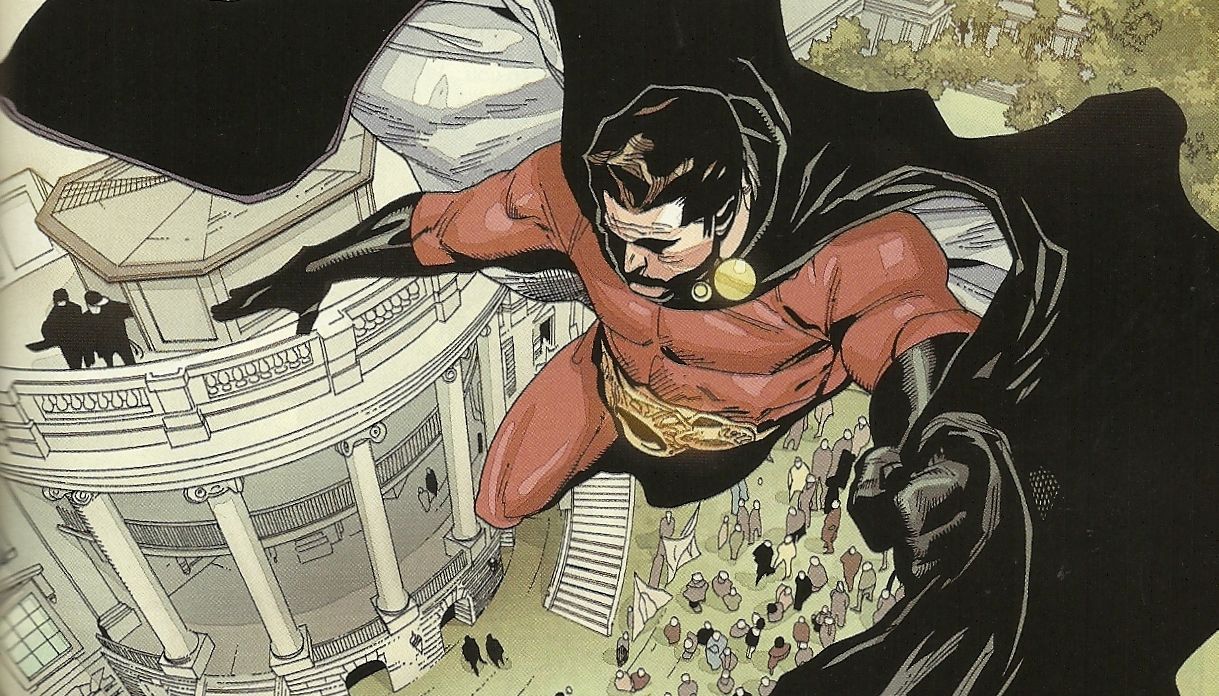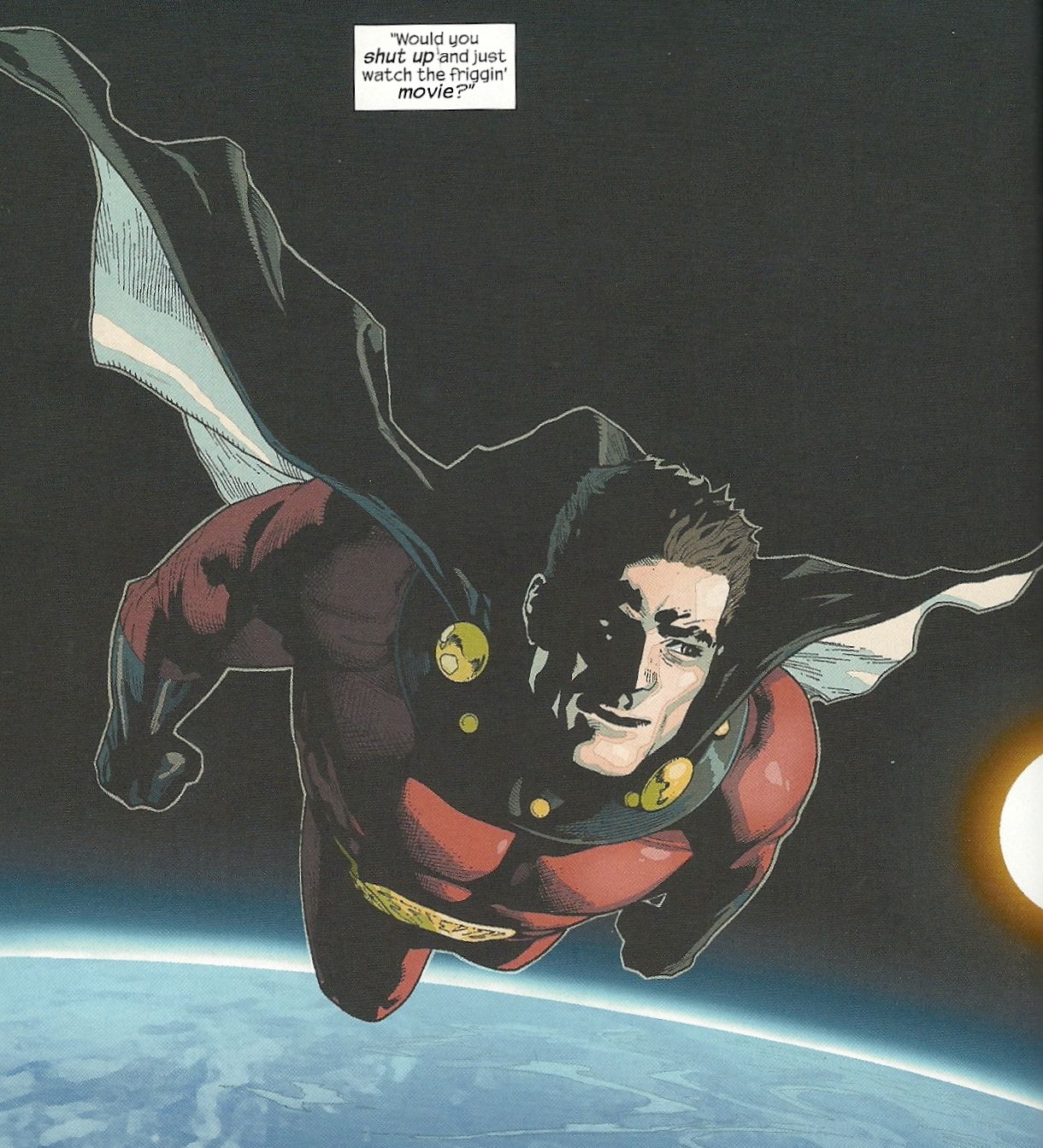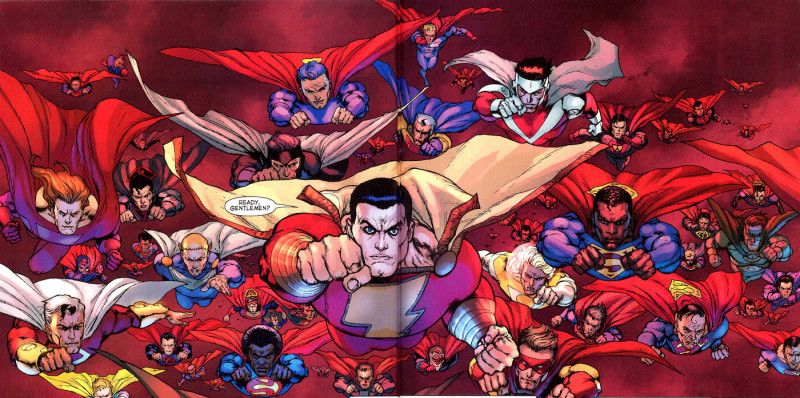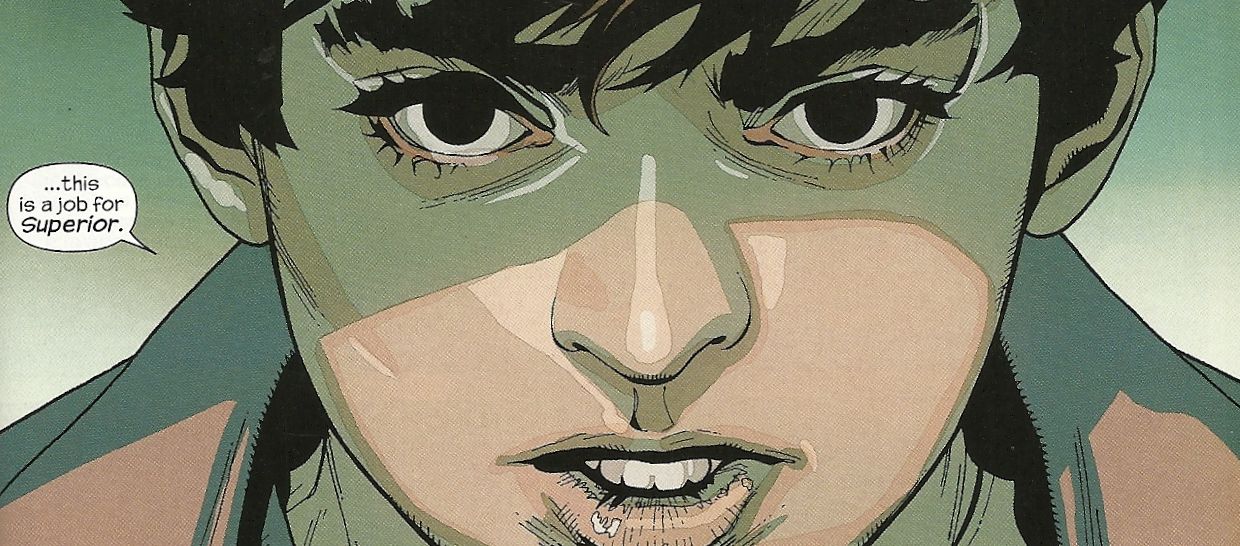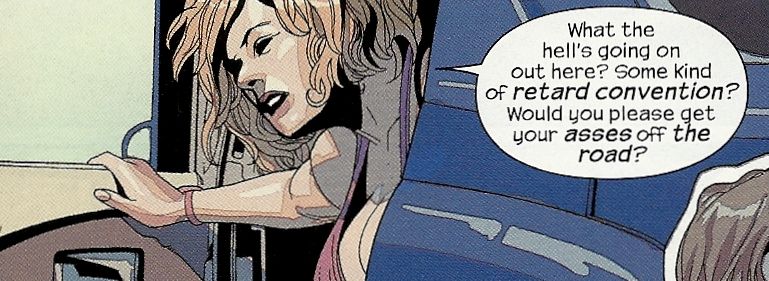By now I imagine most fans have had a chance to see director Zack Snyder's big-budget Man of Steel.
I know several aspects of the film have stirred passions of some devotees who know and like Superman better than your average movie-goer, and there are sharply divided views on some of the Man of Steel's actions. (I thought it was a pretty-OK film, far better than the last couple of Superman films, and most of its major problems could have been corrected by an edit that left some of the less Supermanly activity on the cutting-room floor. And a Krypto cameo. And 100 percent more more Jimmy Olsen).
I don't really pay much attention to box-office receipts, nor do I aggregate film reviews, but, as far as I can tell, the movie seems to have done all right and to have been generally well-received. It may not have been The Dark Knight but, at the very least, it didn't go over like a radioactive lead balloon, like Jonah Hex or Green Lantern. I hope it did well enough to generate a sequel, mostly because I'd like to see Hollywood get a chance to dig deeper into Superman's superlative rogues gallery than just using Luthor and/or the Phantom Zone criminals over and over.
And partly because I think it would be awful if the next Superman film wasn't a Superman film, but a Superior film.
Superior is the title character of the seven-issue, 2011-2012 miniseries written by Mark Millar and penciled by Leinil Yu. Like Millar's The Secret Service, the film rights to Superior are held by Matthew Vaughn, who previously adapted Millar's Kick-Ass and is one of the producers of its sequel, due out this year. And just as with Millar's 2005 series (with artist J.G. Jones), Wanted was a re-working of a Secret Society of Super-Villains pitch rejected by DC Comics, starring a barely veiled versions of DC characters like Deadshot, Catwoman, Lex Luthor, The Joker and about a dozen other familiar characters, Superior is as close to Superman as you can get without slapping an "S" on his chest .
Physically, the only thing differentiating the two caped strongmen is that Superior lacks an S-curl in his hairdo (as, come to think of it, does the Man of Steel Superman). His costume differs only in color scheme (it's red where Superman's is blue, and black where Superman's is red), and he lacks a chest symbol of any kind, instead wearing a big belt that's evocative of the sort a boxing or professional wrestling champion might wear. Oh, and he wears gloves.
His super-powers include super-strength, flight, invincibility, freezing breath, super-hearing and, in addition to shooting lasers from his eyes, he also has X-ray and telescopic vision. An alien from another planet, he gets his powers from Earth's atmosphere and Earth's yellow sun. His amazing powers are matched only by his unwavering desire to always do the right thing, something that has cost him some of his popularity since his creation in the comic books of the 1930s, and he is repeatedly derided and applauded as a Boy Scout. (While Superman may often be called "the big, blue Boy Scout," Superior is referred to as "the big, red Boy Scout," which is, you know, a totally different thing.)
The main difference between the two characters is that Superman is, in our world, a fictional character and, while Superior starts that way, too, he becomes real when a 12-year-old boy with multiple sclerosis makes a wish and becomes Superior.
Millar and Yu are hardly the first creators to come up with their own Superman analog. Hell, the superhero genre was founded on various publishers and editors telling their writers and artists to come up with their own versions of Superman, which gave us a dizzying array of super-people, some of whom are still with us (Batman and Captain Marvel, spring most immediately to mind).
Generally, some pains are taken to disguise the analogous nature of the Superman stand-in, though, through hair color or costuming or, at least in one case on this list, race: Marvel has had Hyperion, Omega the Unknown and The Sentry and a few other lesser-knowns with even less staying power, while other publishers and imprints (some owned by DC itself) have given us Icon, Supreme, Majestic, The Samaritan, Apollo, Invincible, The Saint, The Plutonian, The Homelander, Sovereign, Eric from A God Somewhere, and so on (those are the ones off the top of my head, without wasting time on an Internet search).
What's so unusual about Millar and Yu's fake Superman is that, unlike most of those above, they don't invent their Superman to make any real commentary on the original character, or readers' perceptions of the character, or the character as a representative of the superhero genre in general, or as commentary on genre or as an extended joke or gag of some sort. The plot of Superior boils down to "What if Superman — not just any superhero, but Superman himself — suddenly became real?" and it's therefore incredibly difficult to divorce their comic from Superman; literally the only changes they made to Superman were cosmetic. Oh, and the last three letters of his name.
As uncomfortable as it is to see creators of this caliber so ruthlessly appropriate the creative property of another, rival publisher — I suppose here we could argue that Superman should be in the public domain -- one could at least applaud the fact that they're not shy about it.
The book ends with a scene from just about every Superman movie, and with a nod to so many Silver Age Superman comics, with the Superman character winking at the audience. The very last panel reads, "Dedicated to Christopher Reeve and Richard Donner with love and admiration."
Before actually reading the trade paperback collection, I had heard people comparing the character to DC's Captain Marvel, and not merely because they both wear red Spandex. See, the protagonist of the book, the 12-year-old Simon Pooni, spends most of his time confined to either a wheel chair or crutches, and then becomes superman Superior, although keeping his 12-year-old mind (and 12-year-old, profanity-laced vocabulary). Not unlike little-boy Billy Batson becomes adult hero Captain Marvel (or "Shazam," as he's since been officially renamed), or the "crippled' or "lame" (to use the words of the era) Freddy Freeman, who had to use a crutch to get around, became Captain Marvel Jr. when he said his magic word.
The boy-to-adult transformation is about all Simon/Superior has in common with either of the Captains Marvel, though, and, unlike them, he doesn't really have the ability to change back and forth. There is one moment where Simon gets to willingly transform into Superior, and in that moment, a bolt of lightning streaks out of the sky toward his house, a la the magic lightning that makes Billy and Freddy Marvel-ous, but, in that same scene, Simon speaks a Superman derived line:
I should probably note that I wasn't expecting much out of this book. I didn't read it when it originally came out, obviously, and I didn't really seek out the trade — Millar kind of lost me during the first few issues of Kick-Ass, which struck me as relentlessly derivative and virtually logic-free, and nothing he's produced since really excited me, like the What if Batman were evil? series Nemesis and, of course, this What if Superman were real? series.
I just recently read it because I work in a library, and was checking it in. An awful lot of my comics reading, at least of trades, tends to happen like this, a sort of Russian roulette of comic-book selection: "Oh, here's this book in my hands now, and I haven't read it yet. Maybe I should read it tonight." Like that.
I got to the second panel, where the villain is named "Abraxas," the name of both a Marvel villain and a DC villain, and I sighed and put the book down for the night. I tried again a few days later, this time with much lowered expectations for anything approaching original, and made it all the way through that time.
That and the blatant, wholesale appropriation of the Superman character weren't the only things that made me uncomfortable: There was also the number of times Millar had different characters using the word "retard," which I already complained a bit about on my home blog. One character was a villain and another a villainous 12-year-old henchman but the third is our narrator and the heroine of the story.
This is the plot of the comic book, which obviously will contain spoilers: Simon Poony was a popular student with what appeared to be a promising career in basketball, until he developed multiple sclerosis and suddenly even simple things like stairs and taking baths became incredibly difficult tasks for him, and most of his friends abandoned him, save Chris, who at least meets Simon at the movies once a week.
When we meet them, they're at the theater, watching Superior 5. One night, Simon is visited by a talking monkey in an astronaut suit who grants him a wish. Simon wishes himself into Superior, and the monkey tells him he'll be back in a week to explain everything. In the meantime, Simon's stuck in Superior's body, super-powers and all.
Unsure what to do, Simon visits Chris and confides in him, and, after they mess around exploring his powers, Simon spends a week doing super-deeds, culminating in arresting every single member of the Taliban out of Afghanistan in a single night, without killing anyone, at the behest of President Barack Obama and then feeding all of Africa.
Meanwhile, a Lois Lane-like television reporter (albeit a more hard-nosed, amoral one; that's her mentioning the "retard convention" above) is willing to go to any lengths to meet Superior, including driving her car off a pier and hoping he comes to her rescue (I guess Millar could have had her jump out a window, but that might have been too on the nose even for him) and, of course, "giving him the best sex of his life." She's the narrator of the story, it should be mentioned, although we don't actually meet her until the third issue, which seems an awful long time for a comic book to be coy about who's narrating.
She eventually does get the whole story of Superior when his powers are snatched away by the same space monkey who gave them to him: It turns out he isn't a space monkey, but -- and here's the first twist to the story -- rather a who has spent the last 500 years unable to get anyone to sell their soul to him. He now has a deadline he has to meet or be severely, Satanically punished, so he grants Simon his outrageous wish, and then takes it away, promising that he won't restore the powers unless Simon agrees to sell his soul.
As extra incentive, the demon gives one of Simon's bullying classmates the powers of Abraxas, and together they start destroying Metropol—er, New York City, forcing Simon to give up his soul to save the lives of millions.
Amusingly, the entire tale is narrated as if it were what the reporter was planning as her expose on the real story of Superior (as if space monkeys, demons and bartering for souls was going to win her a Pulitzer rather than a reprimand from her editor for crazy-talk).
There is, of course, a twist ending, which keeps the demon from actually collecting Simon's soul, and I was greatly relieved when I got to that part and discovered it wasn't the exact same twist that defeated the villainous Neron at the end of Mark Waid's 1995 Underworld Unleashed series, in which Captain Marvel defeated the devil by offering him his soul. Given how dependent the story is on other comics and movies, though, I was starting to get worried it might just have cold-lifted the ending from Underworld Unleashed (a somewhat complicated story to summarize here, but it involves the devil pursuing the soul of Captain Marvel, although everyone thinks he's actually after the soul of Superman).
Another uncomfortable aspect of the comic? It's amazing how much pop-culture shorthand Millar uses, and not just in the Superman ... let's be kind and say "homage." Some of it is in the storytelling itself.
We learn of Superior's Boy Scout image when Simon and Chris say he's a Boy Scout, and that he needs to be more like Bond or Jason Bourne or Wolverine. (And as often the case with Millar comics, references are made to real celebrities; here's it's Lindsay Lohan and LeBron James.)
When Simon has turned into Superior and is trying to explain himself to Chris, Millar writes, "You remember that scene in Big where the main character tries to explain to his best friend how he aged twenty years overnight?" and then recounts the scene for the benefit of the readers, before ending with, "Well, Simon's reveal to Chris was somewhat less elegant" and then montaging past it.
"Somewhat less elegant" is probably a pretty good way to describe this comic, come to think of it. Somewhat less elegant than what, you may ask ...?
Well, somewhat less elegant than just about every comic book I've ever read, I suppose.
Now, comic books (and books, and other stuff) get optioned for films all the time — constantly, really — and while I don't have anything approaching a handle on the the exact percentage or anything, obviously not everything that gets optioned ever actually gets turned into a movie.
As for Superior ever making it all the way to the silver screen, much may depend on how long the current, apparently inexhaustible superhero movie boom goes on, and, perhaps how well Man of Steel does (and I'm honestly not sure if it doing really well or it doing really poorly would make it easier for a studio to produce and sell a Superman movie pastiche like this), and perhaps how well Kick-Ass 2 does.
If it does ever get made into a film, I suspect that like Wanted and Kick-Ass it will be changed quite a bit, so its trappings aren't so incredibly Superman-like (many of the Superman references, like some of his specific powers, his origin and the source of his powers have nothing at all to do with the plot; they simply remind us that we're supposed to think of Superior as Superman). And I don't know, I imagine they'll ditch the R-word and most of the profanity, as kids in movies don't generally talk like kids in real life do (that is, swearing constantly).
Hell, I suppose it could even turn out to be a good movie, but man, it's hard to imagine a more cynical, more creatively bankrupt comic to serve as source material for a movie.
If they make another Superman movie, a Man of Steel 2, I do hope it's superior to Man of Steel. I just hope it isn't Superior.

